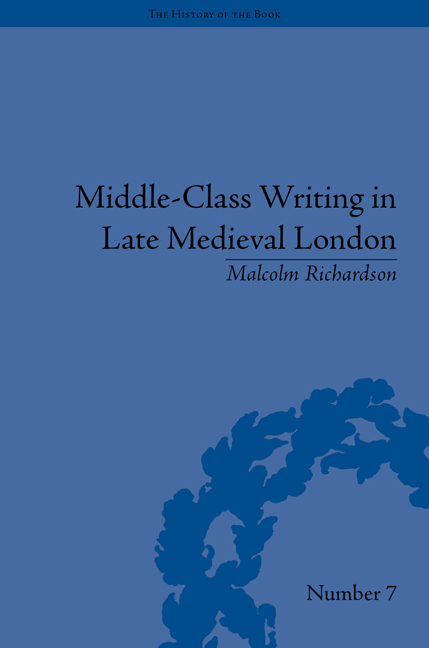Book contents
- Frontmatter
- CONTENTS
- Acknowledgements
- List of Abbreviations
- List of Tables
- Introduction: Pirates and Pens
- 1 London Middle-Class Writing: The Institutional Bases
- 2 ‘An Inextricable Labyrinth’: The Major Genres of Civic Life
- 3 English Middle-Class Writing in the Earlier Fifteenth Century: The Vernacular Letters
- 4 Women's Letters and Men's Books
- Conclusions and Speculations
- Notes
- Works Cited
- Index
2 - ‘An Inextricable Labyrinth’: The Major Genres of Civic Life
- Frontmatter
- CONTENTS
- Acknowledgements
- List of Abbreviations
- List of Tables
- Introduction: Pirates and Pens
- 1 London Middle-Class Writing: The Institutional Bases
- 2 ‘An Inextricable Labyrinth’: The Major Genres of Civic Life
- 3 English Middle-Class Writing in the Earlier Fifteenth Century: The Vernacular Letters
- 4 Women's Letters and Men's Books
- Conclusions and Speculations
- Notes
- Works Cited
- Index
Summary
Be sure that what you do is written out extensively in your books; never spare your pen.
Giovanni di Pagolo Morelli, Italian merchant, in his Ricordi (1393–1411).Also, Syres Baylyves, ye shal trewely gader togeder and kepe the goodes of the craft, that is to seye yowre charteres, youre commun seel, youre Boxes, youre keyes, youre bokes of wrytynges and all other goodes of the craft.
Fifteenth-century oath of the bailiffs of the London Weavers' Guild.The quotations above illustrate the centrality of written documentation to merchants of the fourteenth century, but they mask the different routes to pragmatic literacy taken by Italian and English merchants. The Florentine Giovanni Morelli had imbibed the skill of writing in Latin and the vernacular through a reasonably well organized school system and curriculum as well as through his experiences in the counting house; English guildsmen had to learn by a slower process of on the-job training, aided, feebly, by some time in the schoolroom. Morelli's advice to posterity is straightforward: keep good records. The oath taken by the bailiff of the London Weavers' Guild illustrates a similar point obliquely: the ‘Goods of the [Weavers'] craft’ that the bailiff is to maintain are here listed as charters, seals, storage boxes and books of writing. Its total absence of the whiff of the Nick Bottom's trade powerfully marks how ‘hard-handed men’ of London grew to ‘labour in their minds’ over the written record between the earlier fourteenth and the middle of the fifteenth centuries.
- Type
- Chapter
- Information
- Middle-Class Writing in Late Medieval London , pp. 55 - 104Publisher: Pickering & ChattoFirst published in: 2014



